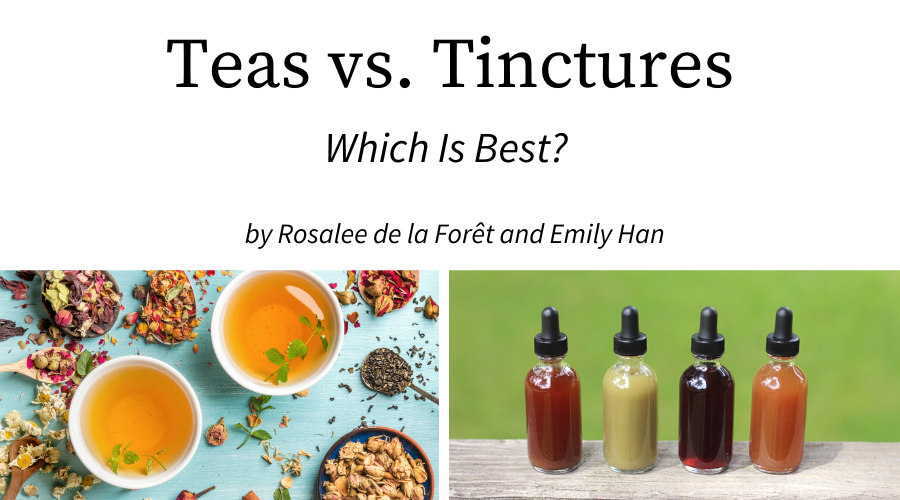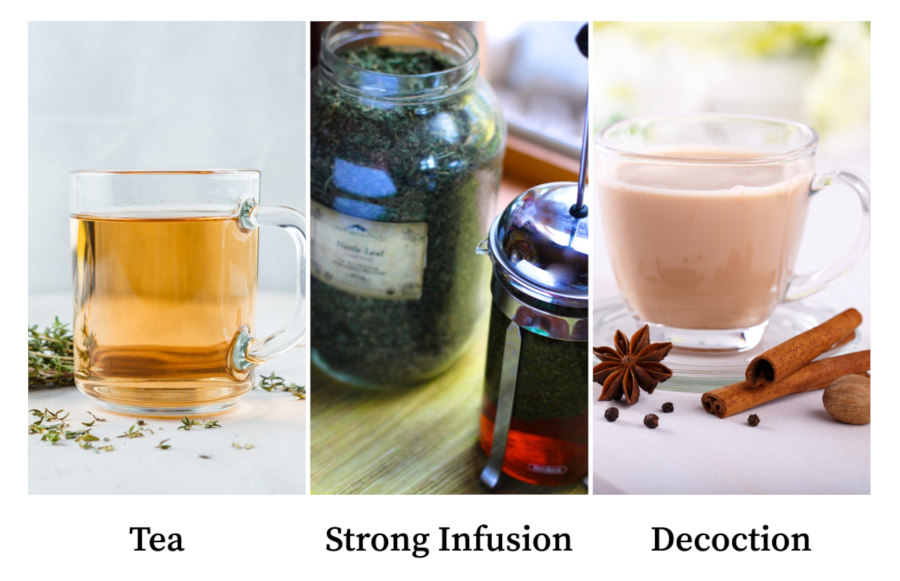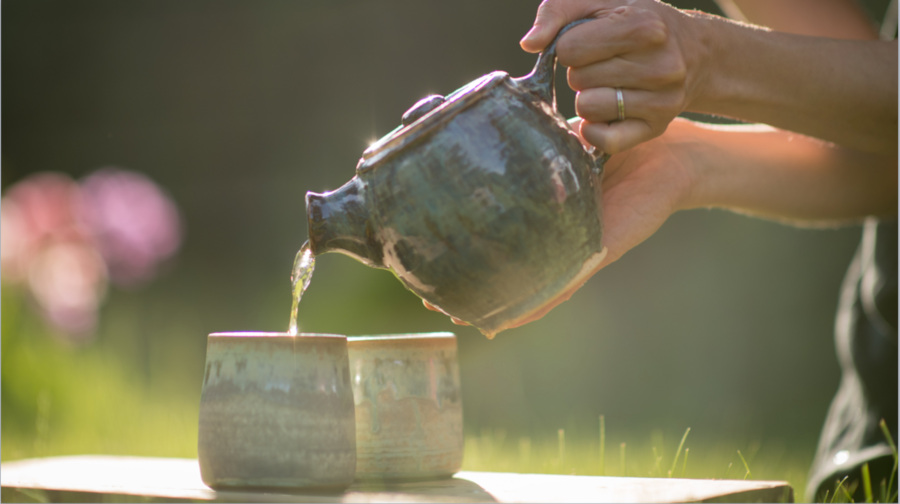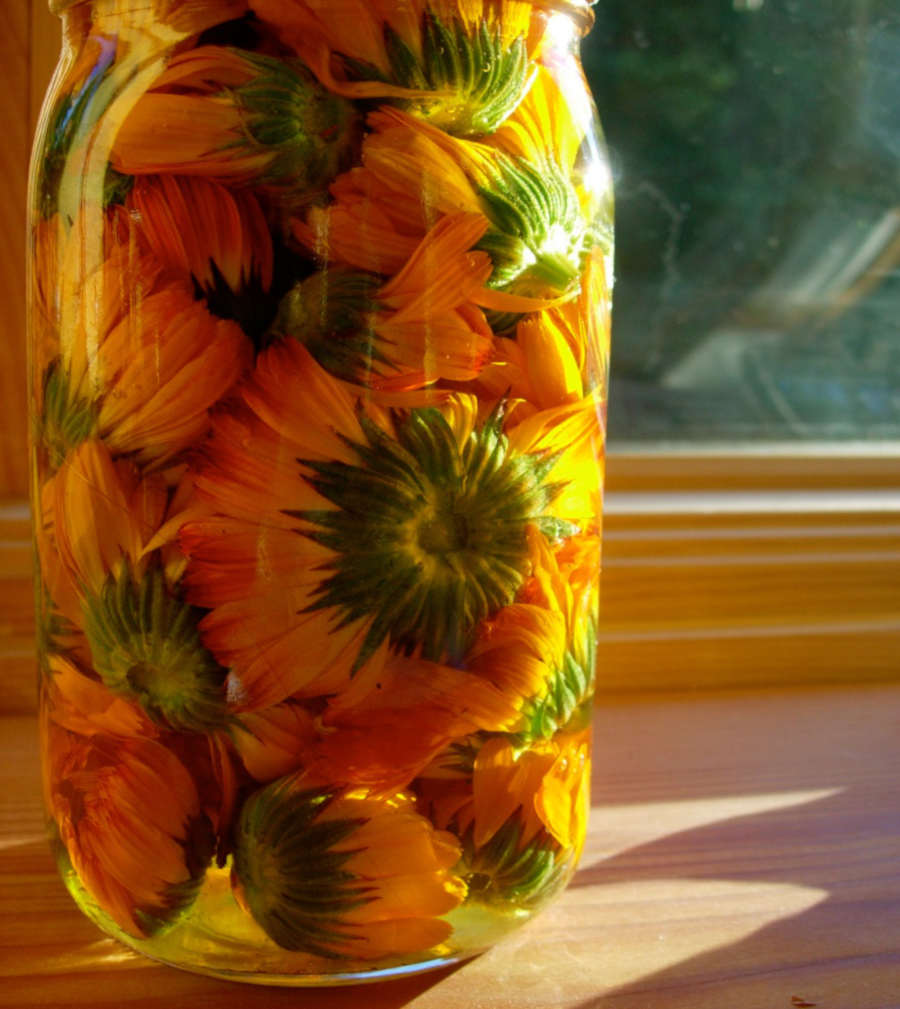Get weekly tips, recipes, and my Herbal Jumpstart e-course! Sign up for free today.

Tincture vs Tea
Share this! |
|
Part of the joy of working with herbs is knowing how to best work with herbal medicinals. There are advantages to making your own herbal preparations, but there are a lot of beginner mistakes to avoid when making herbal medicinals at home.
In this video, I am joined by my friend and fellow herbalist, Emily Han, to share the pros and cons of herbal teas vs. herbal tinctures.
We’ll also share how you can get clear, step-by-step recipes for both a tea and a tincture made with stinging nettle (Urtica dioica) so that you can make the best herbal medicinals at home!
-- TIMESTAMPS --
- 00:00 - Introduction
- 02:21 - Are herbal tinctures stronger than herbal teas?
- 02:39 - What is a tea?
- 05:10 - Four advantages of tea
- 06:44 - Four disadvantages of tea
- 07:52 - How Rooted Medicine Circle can teach you how to make herbal medicinals at home that actually work
- 08:56 - What is a tincture?
- 09:31 - Four advantages of tinctures
- 10:30 - Four disadvantages of tinctures
- 12:43 - Are herbal teas or herbal tinctures better for you?
- 15:17 - How to make potent fresh stinging nettle tincture and how to make nutrient-dense stinging nettle tea
Transcript of the Tincture vs Tea Video
Many people claim that herb tinctures are stronger and therefore superior to herbal teas.
But is that really true?
Let’s take a step back to examine the pros and cons of herbal teas and tinctures and arrive at a better understanding of when you might want to reach for one over the other.
What is an Herbal Tea?
The act of combining water and herbs to make a tea is one of herbalism’s foundational remedies.
It’s also one of the most versatile preparations. A cup of tea can simply be a delicious beverage shared with friends, or a tea can be medicine that we use to soothe a sore throat, calm our nerves, or boost our immune system.
Let’s look at different water-based preparations.
Tea can refer to any type of water-based preparation, whether it’s herbal or caffeinated.
However, tea often refers to small amounts of herbs, steeped for a short amount of time. Examples include green, black, or white teas that come from the Camellia sinensis plant or herbal teas like chamomile and peppermint.
A strong infusion, sometimes called a nourishing herbal infusion, is made when a large amount of plant material, often an ounce, is steeped for several hours to overnight. This extended steeping time helps to extract vitamins and minerals, which aren’t readily extracted with shorter steeping times. Many times this preparation is used for nutrient-dense herbs. Some people think of this as their multivitamin.
For example, herbalists commonly use nettle (Urtica dioica) as a strong infusion. To make this, you would use 1 ounce or 30 grams of dried nettle leaf and steep it in 1 quart of just-boiled water for 4 to 8 hours.
A decoction is when herbs are simmered for minutes or even hours. The extended high heat helps to break down strong herbal materials like roots, barks, seeds, and hard mushrooms.
Teas, strong infusions, and decoctions all use water to extract the beneficial qualities of the plants. The difference between them is how long you steep or simmer them as well as the quantity of herbs you use. Each preparation offers different advantages, so it’s important to know when to use one method over another.
Four Advantages of Herbal Teas
#1. The Healing Process
The act of making and drinking tea can be a part of the healing process. Smelling the herbs as you gather them in your teapot and then savoring the tea sip by sip feels very different from popping a few herbal capsules or even using some squirts of an herbal tincture.
#2. Water
One of the biggest advantages of teas is water. When discussing herbal
tea, herbs often get all the attention; but drinking life-giving and
sustaining water forms an important part of a tea’s healing abilities.
Wherever
water flows on this earth, whether it’s the rain falling from the sky,
rivers running through the earth, or water coursing through our bodies,
water connects all life. It also transports valuable chemicals,
minerals, and a wide range of nutrients as well as hydration.
Water
is the universal solvent. It extracts a lot of constituents: vitamins,
minerals, flavonoids. If you live in an area where drinking water is
clean, then water is also easily accessible.
#3. Dosage
Water-based extractions are convenient for high-dosage herbs. If the dosage of an herb is an ounce or a large handful, then making that into a tea is often best.
#4. Affordable
Teas are the most affordable of all herbal preparations. This is especially true when you harvest your own herbs but is also true when buying herbs in bulk.
Four Disadvantages of Herbal Teas
#1. Time
Some people find that making tea takes too much time. And because teas aren’t preserved in any way, they need to be made fresh daily.
#2. Bathroom Breaks
While drinking a lot of water-based teas can be a benefit, it can also be a nuisance in some situations, for example before bedtime or during a long drive.
#3. Messy
Tea can be messy, especially if you are on the go. Spilling a bottle of capsules is a very different experience than spilling your cup of tea!
#4. Too Weak
Knowing how to make medicinal-strength teas often presents challenges for home medicine makers. Many people prepare teas in a way that’s too weak, with either not enough plants or they are not steeped or simmered long enough.
And then of course there’s the taste. Teas can taste bitter or otherwise harsh. Knowing how to make a great tasting tea that is also medicinal is an art form!
We love teas because they are simple to make, are affordable and are a direct connection to the plants that gift us medicine. Teas can also be deeply healing. But there’s a lot to know about how to make tea!
For example…
- When do you make a short infusion vs. a long infusion?
- When is it best to used dried plants vs. fresh?
- When it is best to use hot water vs. cool water?
- How do you know how much herbs to use?
There’s a lot to know about medicinal teas!
It’s our passion to see you succeed with herbal medicine.
That’s why we created our interactive online course, Rooted Medicine Circle. This 10-month course shows you how to make strong herbal medicines at home that actually work.
Our goal is to see you confidently making strong herbal medicines at home!
Rooted Medicine Circle only enrolls once a year in January. You can click here to get signed up on the waitlist. You’ll get all the details for the course when we open enrollment.
What Is a Tincture?
Tinctures, or alcohol extracts, are made by using alcohol to extract the herbs.
Why the two names? Most people refer to these as tinctures. But technically “tincture” is a medical term and supplement companies aren’t allowed to use that on their packaging. That’s why when you see tinctures at the store, they are labeled “alcohol extracts.”
Tinctures can be made in a variety of ways. You can use dried or fresh plants, different plant parts, different alcohol proofs, and different ratios of alcohol to herbs.
Four Advantages of Herb Tinctures
#1. Acts Fast
Tinctures act fast, often within minutes. They are easy to take and easy for your body to digest. If you have an acute situation that you want to address quickly, then tinctures are a great choice.
#2. Affordable
If you make tinctures yourself, you can save a lot of money. The biggest expense tends to be the alcohol.
#3. Extracts Resins and Alkaloids
Alcohol excels at extracting alkaloids and resins, which is something that water is not great at. If you are working with a plant that has valuable alkaloids or is high in resins, then tinctures may be ideal.
#4. Fresh Plants
Another advantage of tinctures is that they work well for fresh plants. In fact, some herbs, like milky oats and chickweed, excel as fresh tincture extracts.
Four Disadvantages of Herb Tinctures
#1. Not Entirely Easy to Make
Tinctures can appear to be easy to make. Basically it’s just mixing plants and alcohol. But to make potent herbal medicine, a lot more goes into this. Important considerations include the type of alcohol for each plant, the ratio of alcohol to plant matter, whether to use fresh or dried plant material, etc.
Home medicine makers often make tinctures too weak. For example, they don’t use enough plant material or don’t finely chop the plants, so the ratio of plants to alcohol is very low. We see a lot of pretty photos on social media that in reality are very weak and poor herbal medicines.
This picture is a great example of that.
#2. Alcohol
Taking tinctures means taking alcohol. The amount of alcohol in a
typical dosage of tincture is very small, often akin to what’s naturally
found in a ripe banana. But it’s still alcohol. For people who abstain
from alcohol entirely, tinctures aren’t a good choice.
Side note…
You may have heard that adding tinctures to hot water removes the alcohol.
That’s actually a myth.
It’s
not physically possible to remove all alcohol in this way. Furthermore,
adding tinctures to hot or boiling water can diminish the plants
aromatics, so we don’t always recommend this practice, especially for
plants high in essential oils.
#3. Expensive
If you make your own tinctures, they can be more affordable. However, if you buy tinctures, they can be really expensive, especially if you take larger doses for either chronic or acute situations.
#4. What it Extracts (and Doesn't Extract)
While alcohol excels at extracting alkaloids and resins, it doesn’t extract vitamins and minerals. If you are working with a plant for its nutrient qualities, then you don’t want to use a tincture.
Something else to consider when using alcohol is do you want to extract alkaloids? Sometimes we specifically don’t want to extract alkaloids because they are harmful, such as in the case with comfrey and pyrrolizidine alkaloids.
So, Tincture vs Tea, Which is Best?
As you will often find in herbal medicine, there is no one true answer to whether one preparation is better than another.
Instead, it comes down to knowing the plants well, knowing the gifts you seek, and then knowing how to choose the best preparation for your needs.
Let’s take nettle for example.
Nettle is rich in nutrients and minerals. Many herbalists drink strong infusions of nettles frequently in order to receive the nourishment it provides. When working with nettle specifically for its nutrients, a water-based extraction is far superior to a tincture or alcohol-based extraction.
But tea isn’t always the best preparation for nettle.
Fresh nettle has some unique gifts for reducing acute inflammation associated with seasonal allergies and for supporting people with blood sugar imbalances like insulin resistance and type 2 diabetes.
Using a tincture made with fresh nettle is a great choice for acute inflammation and for addressing blood sugar imbalances.
In other words, each preparation has its advantages and disadvantages, but no preparation is always going to be the best or worst for a given situation. Instead, you want to know how to use it well.
To Sum Up
Reach for a tea when you want a comforting, warm beverage or when working with herbs that are nutrient dense, taken in small to large dosages, and taste mild.
Reach for a tincture when you want something extra convenient and fast acting, to extract beneficial alkaloids and resins, and to preserve the fresh qualities of herbs.
Of course, there are more herbal medicinals than just teas and tinctures!
There are many different herbal preparations and each one has their own unique advantages and disadvantages.
If you’re interested in making herbal medicines at home, then check out our interactive live online course, Rooted Medicine Circle.
This course helps you confidently create powerful herbal remedies in your own kitchen.
Rooted Medicine Circle only enrolls once a year in January. You can click here to get signed up on the waitlist. You’ll get all the details for the course when we open enrollment.
Before we go we want to share some recipes from Rooted Medicine Circle! These recipes show you exactly how to make a strong tea and tincture with stinging nettle.
As you’ve seen, stinging nettle is so versatile and works great as both a tea and tincture. However, as always, you want to make sure you are making potent herbal medicines. Otherwise you are wasting your time, money, and energy with weak potions.
Our success is seeing your success and we don’t want you to waste your time!
You can get these two recipe cards for free when you sign up using this link.
If you enjoyed this video on Herbal Medicinals and What are the Benefits of Herbal Teas vs. Tinctures and you value trusted herbal information, then I hope you’ll stick around!
The best way to get started is to subscribe to my newsletter at the bottom of this page so you can be the first to get my best herbal insights and recipes.
As always, thank YOU for being a part of this herbal community.

Rosalee is an herbalist and author of the bestselling book Alchemy of Herbs: Transform Everyday Ingredients Into Foods & Remedies That Healand co-author of the bestselling book Wild Remedies: How to Forage Healing Foods and Craft Your Own Herbal Medicine. She's a registered herbalist with the American Herbalist Guild and has taught thousands of students through her online courses. Read about how Rosalee went from having a terminal illness to being a bestselling author in her full story here.



